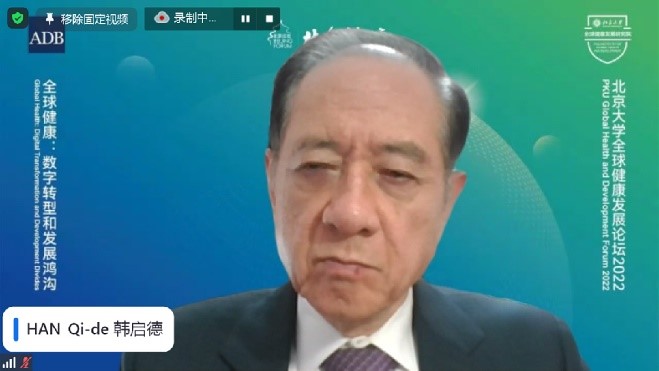On December 22, 2022, the Peking University Global Health and Development Forum 2022 was held with the main theme of Digital Transformation and Development Divides. Co-organized by the Beijing Forum, Asian Development Bank and PKU Institute for Global Health and Development, this Forum brought together world leading scholars, policy researchers and industry leaders from both China and international communities to share their insights and recommendations on the thematic topics, attracted over 10 thousands online viewers participated in the event. HAN Qide, Vice Chairman of the 12th National Committee of the Chinese People’s Political Consultative Conference; Honorary President of China Association for Science and Technology delivered a speech at the Opening.

Ladies and gentlemen, dear friends and colleagues,
Good morning, good afternoon, and good evening! It is my pleasure to welcome all of you to the 2022 Peking Unversity Forum on Global Health and Development, whereever you are tunning in from.
Let me start by thanking the Forum co-organizers, the Beijing Fourm, Asian Development Bank, and of couse the PKU Global Health Institute led by my colleague Prof. Gordon Liu, for putting together such a wonderful global plateform to tackle on the timely topic, “ Global Health: Digital Transformation and Development Divides .”
Digital technologies are shaping the future of global health. It has come to consensus that the strategic and innovative use of digital and cutting-edge information and communication technologies is essential for achieving the triple billion targets of WHO, that is 1 billion more people benefit from universal health coverage, 1 billion more people are better protected from health emergiencs, and 1 billion more people enjoy better health and well-being.
there are technologies with proven potential to enhance health outcomes. Technologies such as the Internet of Things, virtual therapy, artificial interlligence, and blockchain enable data capture, storage, exchange, and sharing across the health ecosystem. These techonologies have the potential to create a contimuum of care with improved medical diagnosis, data-based treatment decision, person-centered care, and many more. In addition, these technologies have great potentials to create more evidence-based knowledge, skills and competnence for professionals to support health care. The COVID-19 pandemic has accelerated the realization of some of these potentials.
Achieving such promise requires all health care stakeholders such as health care providers, policy makers, health tech companies, investors and others, to move in partnership. There are opportunities for various stakeholders to contribute to the full realization of digitally enabled care. To name a few, there are opportunities for physicians and health care systems to implement digital health tools to enhance the workflow and optimize patient care, opportunities for policy makers to improve and adopt payment models that incentivize high-value care, and opportunities to create techonologies and policies to reduce fragmentation, and to scale evidence-based models quickly. As the saying goes, it takes a village to raise a child. To realize the full potential of digital health care, it will take commitments and coordinated efforts from each stakeholder.
We also need to strength and continuing cooperation between and among stakeholders from the global community, from both developed and developing countries. The WHO Global Strategy for Digital Health 2020-2025 sets out a vision to build an internationally connect digital health system. It is worth noting that the global strategy emphasizes equity in access to digital resources so that NO ONE is left behind. The COVID-19 pandemic accelerated the adoption of digital health care around the world. However, many developing countries still lags behind the developed world when it comes to digital access, including internet access. Efforts are needed to address the major impediments faced by least-developed countries in engaging with and accessing new digital health technologies.
There are other challenges for healthcare digital transformation. Some of the most common challenges include securing quality and quantity of data, intergrating data, protecting patient data and patient privacy, and connecting with patients and ensuring patient-centered care. Global collobration and collective wisdom are needed to address the ethics, legal frameworks and governance of these issues within the digital health environment. The growing global challenge of digital waste on health and the environment must also be appropriately managed.
Dear frieds, here I only covered a few issues and I am looking forward to the talks and discussion from experts in the forum. I am sure that Peking Univerity is the great and right place for the conversations. Here we are dedicated to finding solutions to health issues around the world, contributing global public goods for the health and for wellbeing of mankind. In closing, I wish the Forum a great success and all of you a pleasant and productive day.
Thank you all again and wish you all the best for the coming year!